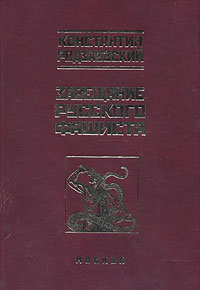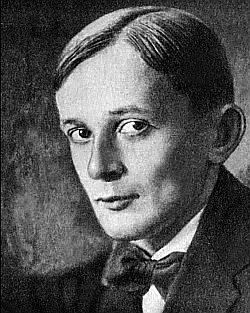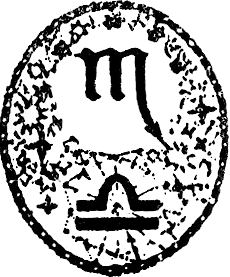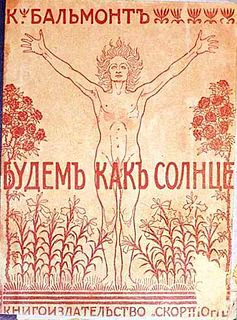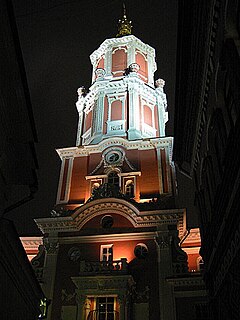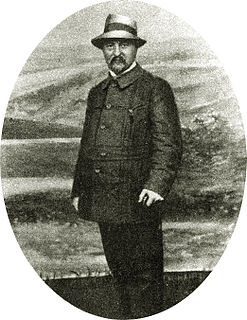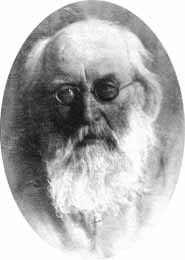 | |
| Author | Konstantin Balmont |
|---|---|
| Original title | Тишина. Лирические поэмы |
| Country | Russian Empire |
| Language | Russian |
| Genre | Russian Symbolism |
Publication date | 1898 |
| Media type | print (Hardback & Paperback) |
| Preceded by | In Boundlessness |
| Followed by | Burning Buildings |
Silence (Russian : Тишина, translit. Tishina, subtitled "Lyric poems", Лирические поэмы) is a third poetry collection by Konstantin Balmont, first published in August 1898 in Saint Petersburg, by Alexey Suvorin's Publishing House. Following In Boundlessness (1895), it features 77 poems, most of which were based upon the author's impressions of his 1896-1897 European journey which took him to Germany, France, Italy and Great Britain, where he read Russian poetry in Oxford. The book's epigraph, "There is some kind of universal hour of silence" (Есть некий час всемирного молчанья) comes from Fyodor Tyutchev's poem "Videniye" (The Vision, Видение). [1] [2]

Russian is an East Slavic language, which is official in the Russian Federation, Belarus, Kazakhstan and Kyrgyzstan, as well as being widely used throughout Eastern Europe, the Baltic states, the Caucasus and Central Asia. It was the de facto language of the Soviet Union until its dissolution on 25 December 1991. Although, nowadays, over two decades after the breakup of the Soviet Union, Russian is used in official capacity or in public life in all the post-Soviet nation-states, as well as in Israel and Mongolia, the rise of state-specific varieties of this language tends to be strongly denied in Russia, in line with the Russian World ideology.
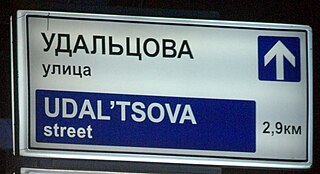
Romanization of Russian is the process of transliterating the Russian language from the Cyrillic script into the Latin script.

Konstantin Dmitriyevich Balmont was a Russian symbolist poet and translator. He was one of the major figures of the Silver Age of Russian Poetry.
Contents
The book, divided into several cycles, was constructed as if it were a musical composition, poems linked both rhythms and inner associations. It bore the first marks of Nietzschean motifs and heroes, notably the "Elemental Genius," who transcends his own humanity in order to break free from all restrictions. Silence was praised by Prince Alexander Urusov who recognized it as a work of a great talent who was beginning to forge his very own, distinctive style in poetry. [3]

Friedrich Nietzsche developed his philosophy during the late 19th century. He owed the awakening of his philosophical interest to reading Arthur Schopenhauer's Die Welt als Wille und Vorstellung and said that Schopenhauer was one of the few thinkers that he respected, dedicating to him his essay Schopenhauer als Erzieher, published in 1874 as one of his Untimely Meditations.

Classical elements typically refer to the concepts in ancient Greece of earth, water, air, fire, and (later) aether, which were proposed to explain the nature and complexity of all matter in terms of simpler substances. Ancient cultures in Babylonia, Japan, Tibet, and India had similar lists, sometimes referring in local languages to "air" as "wind" and the fifth element as "void". The Chinese Wu Xing system lists Wood, Fire, Earth, Metal, and Water, though these are described more as energies or transitions rather than as types of material.
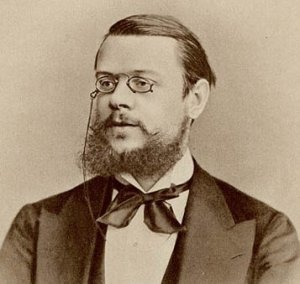
Prince Alexander Ivanovich Urusov was a Russian lawyer, literary critic, translator and philanthropist.




